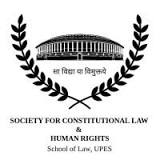 Deadline
Open Deadline
Deadline
Open Deadline
Details of the Organization
UPES School of Law offers various programs like B.A., BBA, B.Com., M.A., Ph.D. The School of Law combines a carefully crafted curriculum with interactive learning methods to prepare students who can contribute towards shaping the legal landscape. With faculty who are leading specialists in their respective subjects, a world-class infrastructure with an in-house moot court for experiential learning, and continuous engagements with industry and academic experts, we nurture students to become professionals who are empathetic and well-versed with the ‘language of law’.
Details of the Blog/Paper
The SCLHR Blog is a student-edited, peer-reviewed and open-access blog maintained by the Society for Constitutional Law and Human Rights. SCLHR seeks to provide a platform that promotes and sustains informed discussion and dialogue on emerging issues in the field of Constitutional Law and Human Rights. They further welcome original contributions from students, researchers, academicians, legal practitioners, and those who are enthusiastic to engage in academic discourse and widen the scope of the Constitutional study for our readers through their creative and informative research works.
Keeping the objective of their society, they highly encourage our authors to explore critical and multidisciplinary perspectives on Constitutional developments in and beyond India. Hence, with the above objectives in mind, they welcome all submissions on the field of Constitutional Law and Human Rights subject to the following guidelines.
Topic of paper/Blog
The SCLHR Blog invites contributions on contemporary issues surrounding Constitutional Law and Human Rights include but not limited to the following:
- Emerging Challenges to Freedom of Expression in the Digital Age
- Balancing Public Security and Civil Liberties: Recent Developments
- Constitutional Amendments: Implications for Human Rights Protections
- Privacy Rights and Surveillance
- Access to Justice and Legal Aid: Bridging the Gap
- Constitutionalism in Times of Crisis: Lessons from Global Events
- Environmental Rights and Constitutional Frameworks
- Freedom of Religion: Contemporary Debates and Challenges
- Ensuring Free and Fair Elections
The submissions must attempt to exhaustively explain their topic within the limit of 1500-2000 words. However, depending upon the quality and depth of research and its expression, relaxation may be given and the word limit may vary. Therefore, it is
recommended to refrain from using a broad topic and to choose a specific one.
Submission Guidelines
Formatting Guidelines
- Submissions should be in Times New Roman, size 12, with 1.5 line spacing, and 1-inch margins on all sides of an A4 sheet.
- Any picture or similar visual representations, if submitted, must be copyright-free.
- All the relevant sources must be duly acknowledged in footnotes conforming to the Bluebook 21st Edition.
- No endnotes and speaking notes are permitted.
- All manuscripts must be submitted in a .doc or .docx format.
Editorial Guidelines
- Each submission shall undergo two rounds of the review process by the Editorial Board for publication which are formative and substantive.
- About three weeks will be taken to review a submission. Once the review is completed, the author may receive comments suggesting changes to content, style, or structure. Authors should be prepared to make suitable changes to their articles as required by the Editorial Board before publication.
- Please follow up if you do not hear from us within three weeks of the submission of your manuscript.
- The Editorial Board strives to provide substantive feedback for every submission that is received. However, it may not always be possible to do so considering a large number of submissions.
- A submission in consideration at the SCLHR Blog must not concurrently be in consideration elsewhere.
- Posts accepted at the SCLHR Blog cannot be cross-published elsewhere. Articles with plagiarism of more than 20% will be rejected.
- Copyright of all the entries shall exclusively vest with UPES. The submission would imply that the author has assigned such rights to UPES.
- The decision of the Editorial Board is final and binding concerning the publication of the submission.












 ADDICTIVE LEARNING TECHNOLOGY LIMITED
ADDICTIVE LEARNING TECHNOLOGY LIMITED